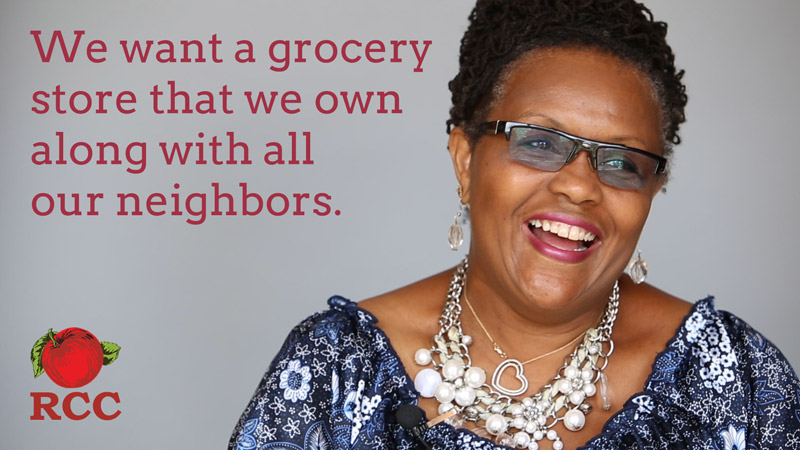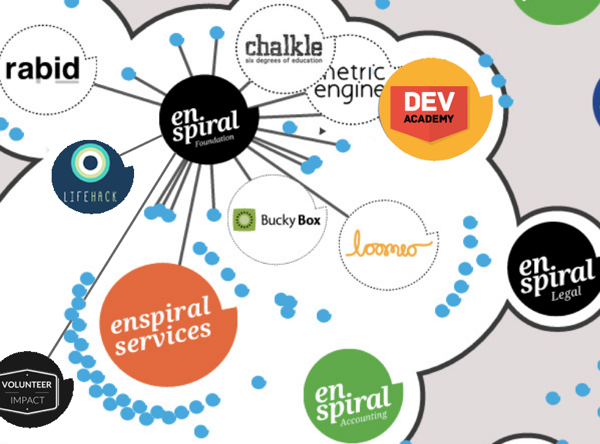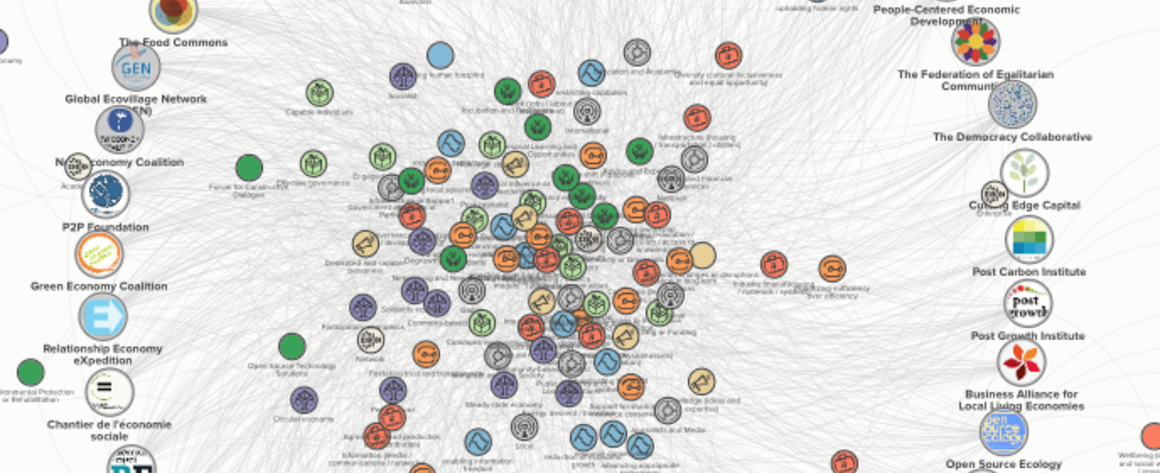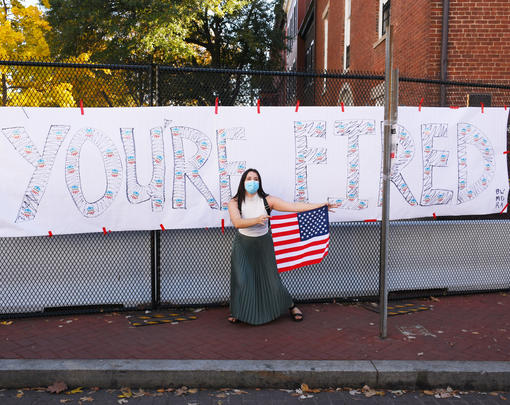At the end of December last year the Next System Project co-hosted a webinar with Real Economy Lab (REL) and the New Economy Coalition on “Mapping the Next System” (video viewable in its entirety here).
Over 500 people signed up for the webinar, testimony to the growing level of interest in understanding the evolving next economy ecosystem, its players, their interrelationships, their theories of change, principles, values, and practices. These issues form the core focus of REL’s current metamapping of the next economy world.
Moderated by Gus Speth, Co-chair of the Next System Project the webinar featured a panel discussion involving Jules Peck of REL, Michel Bauwens of the P2P Foundation, Ferananda Ibarra of VillageLab / Metacurrency Project, Michelle Mascarenhas-Swan of Movement Generation, and Ed Whitfield from the Fund for Democratic Communities.
Jules Peck opened by presenting the purpose of the Real Economy Lab: to build understanding and awareness of alternative ways of running and designing a next economy, and to be a facilitator and connector of next economy change-agents, connecting the dots and creating the conditions for convergence across the next economy ecosystem.
Peck and his colleague Benjamin Brownell explained that at the heart of REL’s online platform is an evolving, innovative, highly visual and interactive network map of the evolving next economy ecosystem. You can view Brownell’s overview of the mapping process and visualization outcomes here. A Kumu video walk-through which illustrates the power of this ecosystem mapping can be found here:
This next economy ecosystem is far from simple. It involves representing the activity and relationships among a rich array of organizations, innovations and experiments encompassing the caring economy, the sharing economy, the provisioning economy, the restorative economy, the regenerative economy, the sustaining economy, the collaborative economy, the solidarity economy, the steady-state economy, the gift economy, the resilient economy, the participatory economy, the new economy, and the many, many organizations engaged in related activities.
REL has been surveying the landscape and identifying the linkages between these diverse initiatives and aims to provide an interactive platform where the cumulative knowledge, aims, and resources of these movements can be drawn together in order to seek common ground and drive coordinated action.
The discussion among the panelists explored the value of mapping the next system:
- What are the leading and recurring challenges in organizing more coherent effort and coalition building within and across this movement? What are the obstacles and challenges that arise?
- What do we, as the constituent parts of a potential movement for a next economy, have in common? What principles, values and alternative economic paradigms motivate our actions, and where are we ultimately aligned? How do we talk about this more openly?
- How can people and organizations build on one another’s efforts and collaboratively work towards a more capable, credible, and coherent movement for systemic change? What are leading theories of change?
- Where are we seeing inspiring or illustrative success stories and convergence underway in the movement? How can we measure progress and promote positive outcomes?
- How might we improve the odds of success? How might REL better support practitioners and thinkers in the next economy world? What tools, data, or support are missing from the system we all work in?
Ed Whitfield, a longstanding campaigner for rights and livelihoods, talked about putting resources back under democratic control. Asked how the Southern Reparations Loan Fund intends to change the economy, he explained that it creates non-extractive funding structures and gets them into the hands of those who need them. Whitfield emphasized the crucial need for next economy players to network and collaborate and the valuable role of tools like the REL metamaps.

Michelle Mascarenhas-Swan from Movement Generation and the Our Power campaign spoke about the right to have access to the resources necessary for productive, dignified and sustainable livelihoods. Securing this right, according to Mascarenhas-Swan, will require all of taking action toward a ‘just transition,’ creating the local living economies that this right depends on.
Mascarenhas-Swan emphasized the need to “restore the muscles of collectivism” to change the rules of the extractive economy and of initiatives in places like California where community groups like @APEN4EJ are orchestrating large resource shifts to move us toward a new economy built on community control. Mascarenhas-Swan added that we need to recognise the root causes of problems that appear “on the surface” but that require a clear vision of democratic economic alternatives in frontline communities around the world.
Ferananda Ibarra (@fer_ananda) spoke passionately of the crucial role of mapping in collective intelligence and of tracing the patterns behind past moments of transformation in a “new expressive capacity,” a harmonization of value systems and the economic means for enacting them. According to Ibarra, we all need to go beyond just managing resources, and work instead to create a “regenerative ecosystem.”
Michel Bauwens spoke about the explosion of experimentation and innovation in the commons and p2p space and the risks that the ‘extractive’ economy represents to such developments. He spoke of the need to knit together different fragmented next economy models such as the commons, open-coops, sharing, and solidarity economy movements. Ecosystemic thinking is also needed. In a given locality, new economic institutions like timebanks and food coops should be connected and working together. For Bauwens, New Zealand’s Enspiral.org serves as a powerful example of this kind of mutual support. He also spoke of the need for new funding models to help make this sort of work possible.

Jules Peck finished the webinar with a call to all those interested in these issues to engage with the work of REL. As with any open-source, open-access resource, the metamapping REL is producing will only be as strong as the data inputted by participants in the next economy space to the mapping process.
Please suggest the names and contacts of organizations that should be included in the metamapping work to REL via email at team@realeconomylab.org. Organizations wishing to complete the metamap survey themselves should feel free to do so at this link in order to be included in REL’s next round of metamapping, projected to cover up to 250 next economy initiatives around the world. REL also welcomes other thoughts and feedback via email.




